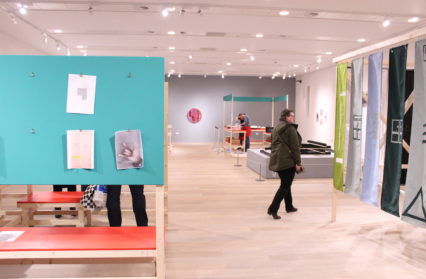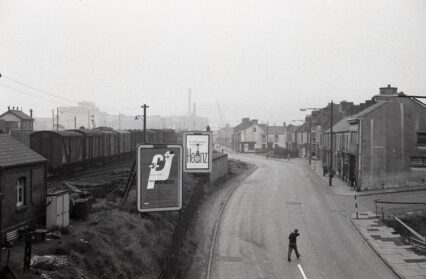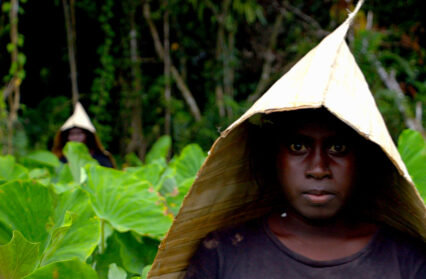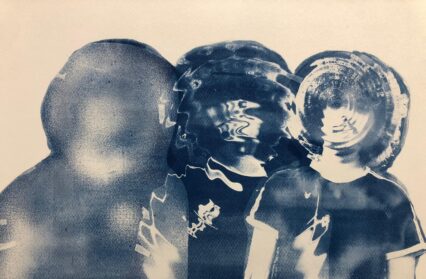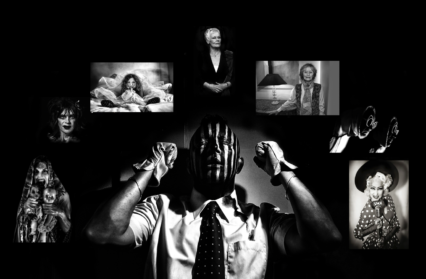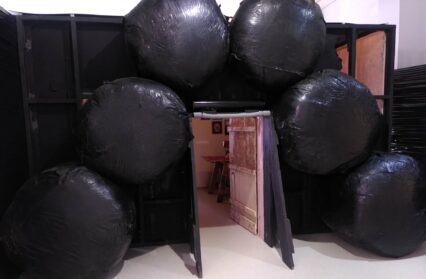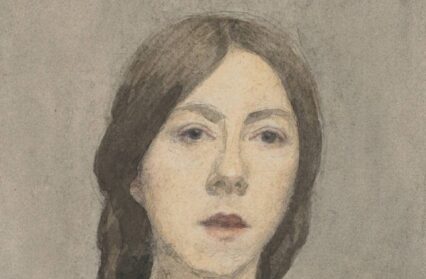Scott Baines explores the ‘market’ theme of Yoke’s latest installation at Wrexham’s Tŷ Pawb, We Can Only See Today.
It is thought that the word ‘market’ stems from Mercury, Roman God of commerce among many other things. In an age of austerity that rings out with the dying cries of neoliberalism, people are increasingly beginning to question what phrases such as the market, free market economy and market regulation mean exactly. In their first UK solo exhibition, Yoke’s We Can Only See Today is a project defined by a temporally minded preoccupation with markets. We can only see today, although, as I write this, today will be yesterday. This focus on the past as irrevocably intermingled with the present is one of the main focuses of the exhibition.
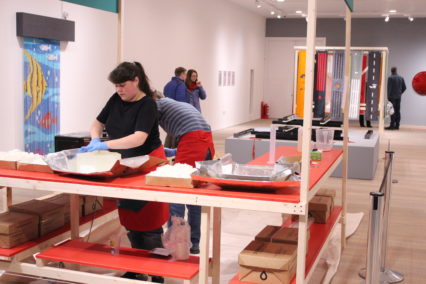 The first instalment is at the far end of the room, and ‘Markets…Not just for trade’ tells a riveting story concerning the history of Wrexham markets, in an almost nonchalantly hieroglyphic style. The pig with two tails is a mere minuscule detail in the newspaper article parallel, but is presented as a deity on the curtains, along with the architectural patterning to all of Wrexham’s markets as its would be language. Lurching horses, church organs and Siamese dogs constitute this eclectic procession of the town’s market history. These multi-coloured panegyrics will be placed on market stalls at the end of the exhibition, an emblematic move of the engagement with its surroundings that the exhibition consistently employs.
The first instalment is at the far end of the room, and ‘Markets…Not just for trade’ tells a riveting story concerning the history of Wrexham markets, in an almost nonchalantly hieroglyphic style. The pig with two tails is a mere minuscule detail in the newspaper article parallel, but is presented as a deity on the curtains, along with the architectural patterning to all of Wrexham’s markets as its would be language. Lurching horses, church organs and Siamese dogs constitute this eclectic procession of the town’s market history. These multi-coloured panegyrics will be placed on market stalls at the end of the exhibition, an emblematic move of the engagement with its surroundings that the exhibition consistently employs.
The second installation tells the story of Ruabon red brick, which was used for Port Sunlight village on the Wirral peninsula. They possessed, and continue to possess, such renowned qualities that they were the preferred choice with which to build the people’s market, a desire ultimately unviable. Several piles of flyers are placed around the gallery offering the opportunity to be given one of these very bricks at the end of the exhibition by simply visiting the gallery, as well as buying a single product from a Tŷ Pawb store holder. ‘Bricks of soap’ tells us that there is stability in fluidity, transformation in transience, and that apparently incompatible elements can morph to create a particular history with particular resonance to a particular people. The solid is sentient because its creator as well as its interpreter does not have ‘rights’ over the clay, as the bible might put it, because the clay can manifest itself in unintended ways. History can travel in a direction unintended by those who think they control the bridle to such a strong animal.
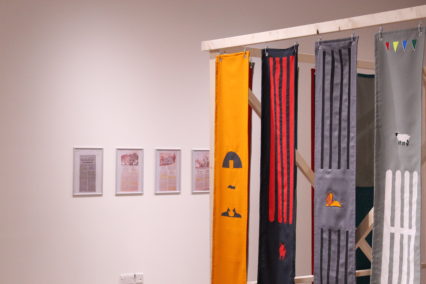 A recurrent motif throughout this room that has seen so much history is how many protestations there have been made towards Wrexham markets throughout their inauguration and lifetime, as evidenced in the newspaper articles. Indeed, the exhibition playfully presents the fact that oftentimes, the cultural conservatism of much British middling towns like Wrexham manifests itself as a discontentment with ‘the new’, whether it be industrial, technological or geo-political. What the exhibition tells us is that such development is not to be opposed, but that the idiosyncrasies of any particular market town can lead to truly mesmeric local phenomena. I am thinking here of the way that Benjamin saw the arcades of Paris as providing a safe and exciting habitat for the Flâneur. In Wrexham, the markets and the arcades combine as one great entity to give the town its own understated Welsh flamboyance.
A recurrent motif throughout this room that has seen so much history is how many protestations there have been made towards Wrexham markets throughout their inauguration and lifetime, as evidenced in the newspaper articles. Indeed, the exhibition playfully presents the fact that oftentimes, the cultural conservatism of much British middling towns like Wrexham manifests itself as a discontentment with ‘the new’, whether it be industrial, technological or geo-political. What the exhibition tells us is that such development is not to be opposed, but that the idiosyncrasies of any particular market town can lead to truly mesmeric local phenomena. I am thinking here of the way that Benjamin saw the arcades of Paris as providing a safe and exciting habitat for the Flâneur. In Wrexham, the markets and the arcades combine as one great entity to give the town its own understated Welsh flamboyance.
The exhibition takes the form of an oval, beginning in the far left of the room, and ending just several steps away to the right. The last of the instalments, the ‘Research Pod’, departs from the three before it because it pertains to personal rather than local history, asking the individual for their first memory of the market. For myself as a child, the people’s market was merely a transition from Chester Street to Market Street, as it was incomprehensibly more exciting than walking one inch more than I needed to of Holt Road. The market has always been the bustling epicentre of local commerce, and in transitioning from a livestock and retail to an arts and entrepreneurial economy, Tŷ Pawb has shown with this latest exhibition how it can maintain a position at the very top of the pecking order in terms of consumerist demand in Wrexham.
Unlike the orthodox and obliged distance in a usual art gallery exhibition, this characteristic is just one that makes it such a proudly interactive creation, with customers being able to observe soap casting and cutting, the next such event falling on 9th February. Nearby, a butcher’s curtain twitches as it senses movement; in the second gallery a bronze bell offers itself to be rung, and to be used as inspiration for people to craft their own. This, too, will be something that becomes a mainstay of the building after the exhibition. Indeed, it is difficult to think of another temporary exhibition whose interactivity provides permanent infrastructural features after it has left.
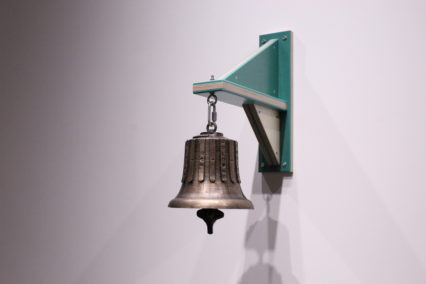 I believe it would be suitable to conclude my thoughts by musing upon the third instalment: ‘Tyranny of Choice’. It presents the viewer with an inflatable delicatessen, with such politically inflected phrases like ‘more options equal more stress’ and ‘finite world multiplied by infinite consumption’. There are many leftist intellectuals today who perceive that we are not as free as we like to think. Firstly, there is a shift in capitalism towards a debt-based economy, essentially a contract ensuring future labour. Secondly, in return for the production of labour, capitalism produces the worker’s desires and needs: a child desires fast food, a couple desire a lawnmower to maintain their garden.
I believe it would be suitable to conclude my thoughts by musing upon the third instalment: ‘Tyranny of Choice’. It presents the viewer with an inflatable delicatessen, with such politically inflected phrases like ‘more options equal more stress’ and ‘finite world multiplied by infinite consumption’. There are many leftist intellectuals today who perceive that we are not as free as we like to think. Firstly, there is a shift in capitalism towards a debt-based economy, essentially a contract ensuring future labour. Secondly, in return for the production of labour, capitalism produces the worker’s desires and needs: a child desires fast food, a couple desire a lawnmower to maintain their garden.
We Can Only See Today is such a prescient exhibition because it echoes a time when the socio-economic system people lived in was very different to anything before or after it, rapidly changing and unpredictable in the scale of that change. As we continue to accelerate the change which defines our world, the same unpredictability applies to us. The question is whether this fresh focus on trade at a local level can destabilise the global hegemony of corporate production enough so as to change the world yet again. Many people have their heads just above water, like icebergs, because like the particles that constitute ice, the individuals that constitute society are so alienated and atomised that they do not dissolve into each other. One solution may be to get your hands on a brick of soap.
We Can Only See Today runs until 10th February 2019 at Wrexham’s Tŷ Pawb.


